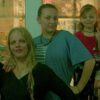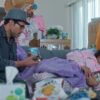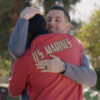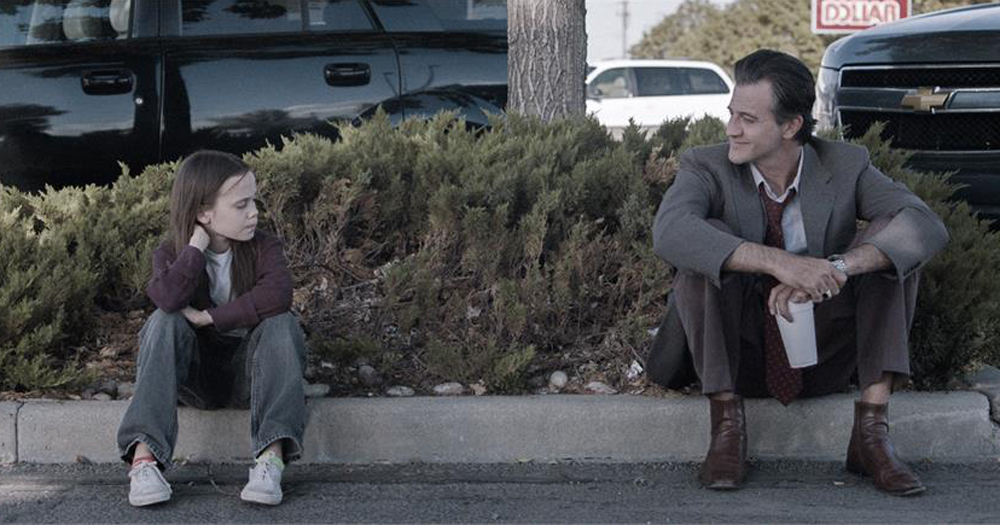Tomorrow, Mel Eslyn will deservedly seize the spotlight when the swanky Spirit Award nominees luncheon commences in Los Angeles where she is up for a Piaget Producers Award. But in no small part, it is because of her willingness work off to the side of the road creatively — and in some cases, quite literally as the crew of her latest film “Lamb” found out.
It was the dead of night in Denver when a skeleton crew of five went back to pick up some shots for Ross Partridge’s adaptation of the Bonnie Nazdam novel, but while they were intent on moving forward, their car was not.
“We get a flat tire and Ross and I are changing it while shouting to the camera team across the bridge what shots we wanted,” Eslyn can say with a laugh now. “I’m the one cranking, and he’s the one pulling the tire off – and the car starts to roll back because we’re on a hill, and I’m right behind it…but I was like, ‘I’m not making my crew change a tire. I’m going to do it.’”

As fearless as Eslyn may have been getting behind that car with the flat in Denver, it’s arguable that she actually had a more dangerous task in helping Partridge bring “Lamb” to the screen. The story of a middle-aged man in the midst of a personal breakdown who abducts an 11-year-old girl with a troubled background of her own, it is a film that refuses define their relationship in a way that would put the audience at ease, deriving tension as much from whether or not David (played by Partridge) will ever return the young Tommie (Oona Laurence) to her parents as it does from the lingering question of if David’s designs on Tommie are less than noble.
With two indelible central performances, it’s a film that sticks to the ribs days, if not months, after seeing it, the kind of high-risk, high-reward endeavor that Eslyn seems to specialize in, her strong interpersonal skills not only coming in handy while on the set but more than likely making sure that as crazy as some of the films she’s produced have been (look no further than Todd Rohal’s “Uncle Kent 2”), they have a strong, relatable human element to them.
On the eve of “Lamb”’s release following its premiere at SXSW where it was one of the festival’s most talked-about films, Eslyn reflected on her heightened profile in the past year after putting together a résumé that includes nearly every job there is on a movie as a crucial cog in the development of the Pacific Northwest production scene, her initial uncertainty about taking “Lamb” on, how she keeps her crews happy and her recent move to produce films under the Duplass Brothers’ deal with Netflix.

Interesting is a very good word. I’ve been in my own bubble with my head down working very hard for years, so to look up and see people suddenly start noticing what you’re doing is a really cool, rewarding feeling. It’s great, and then it’s also weird. Being nominated for something is always such an honor, and then I went to the Genius Awards, and I walk away going, “Well I’m definitely not a genius” — and I didn’t even think I was maybe a genius before I was nominated — but it’s been such a cool year, more than anything because all these good things happened at once, which is overwhelming and awesome.
From what I’ve read, you fell into producing almost by accident after studying to become a writer/director. Is it creatively satisfying?
Yeah, I would say with every year it gets more and more creative. Being allowed into that side of things has probably been the biggest change and the most rewarding step in the last year or two. The biggest thing I’ve learned is just gaining people’s trust and finding the right collaborators — the people that I can inspire, and who inspire me back.
So how did you get involved in “Lamb”?
Ross and I had met awhile ago [when] we did a film together called “Treatment,” and from that, we just kept meeting each other on sets and became friends as well. I was coming back from Sundance the year we were there with “The One I Love” and Ross called and said, “I have this book [‘Lamb’], I’m going to send it to you.” I get this book in the mail, and he’s like, “I’ve developed this into a screenplay, but read the book first. I’d love to work with you on this.”
I read it. I got halfway through and I was like, “If this book goes one way, I’m going to throw it across the room, and I’m going to seriously question my friend and his motives for why he wants to make this…but I’m going to keep reading.” I finished the book, and it was like, “Wow, that actually didn’t do what I thought it would.” I was intrigued, so I said, “Send me the script.” Three days later, I read the script and I thought he did such a wonderful job adapting it. But it still gave me a lot of weirdness in the pit of my stomach, and I was like, “I need to think on it.” Three days later, I’m walking around and I can’t get it out of my head. That’s when I was like, “If I can’t stop thinking about this film, and I’m having an internal debate, it means that I have to do it.” I called him up, and two weeks later, we were in soft prep, which was pretty quick in the general scheme of things.

Yeah, a big reason why I decided to do it was that Ross wanted to direct and be the lead actor, and since he and I had worked together, he knew that I have the split brain of a producer and a director. I’m constantly trying to be both of those people at the same time and we had talked quite a bit going into it about the importance of the tone, and the beats we wanted to hit. Very much a part of my involvement on this was being his eyes and ears at the monitor when he couldn’t be, really watching that and also being a female voice to say, “This would make me feel uncomfortable, but this rides the line just carefully.” We also were very conscious of being there for this 11-year-old girl [Oona Laurence] and her needs. She ended up being the biggest pro I think I’ve ever worked with. She didn’t need anything from anybody.
You’ve said the challenge of “The One I Love” was to keep it interesting with just two people. Was the same was true of this?
Usually, there aren’t a lot of characters in the films that I’m drawn to and I love that challenge of, how am I going to keep people interested for 90 minutes with these two people? I also love making movies in a very intimate environment and not having the people around. “The One I Love,” we obviously had a great idea for how to do that. With “Lamb,” it really was figuring out what that fine line was that we were going to walk, and making sure we were finding ways to push that with the little subtleties within each scene, or the performances, or the way we’d shoot it to keep people on the edge of their seats. We were very much conscious of that throughout the entire shoot.
You’ve been known to make your crews feel incredibly comfortable. Are there tricks you have?
Oh gosh, yes. The biggest one is food. It all goes to [thinking about] basic human needs. Half the time I’m taking people and putting them in the middle of nowhere for three or four weeks away from their homes and their families, so I just think about, what would I want somebody to be thinking about for me? The first thing that always comes to my mind is food, and I want to make sure people are excited every time it’s lunch time, so I’m known for these elaborate craft service tables because I never want anybody to be thinking, “I’m hungry,” on set. A well-fed crew is a very happy crew. It sounds so simple, but that’s a huge thing.
It starts with that and I write a lot of thank you cards. I’m just constantly trying to make sure people understand how much I appreciate them, and I spend a lot of time listening to the crews and asking them, “What’s the dream project? What kind of story do you want to tell?” Even the boom operator, the [production assistants]… everybody’s got their dream project that they want to work on, so I work really hard to pick the right teams per film based on everybody’s needs and desires, and what they want to do.

Absolutely, [though] for “Lamb,” every single person who was there was in love with the story, and was in love with Oona, so it was like we were this family that was traveling together from Denver to Laramie, Wyoming. We also literally shot half the film in the middle of nowhere on a ranch with hundreds of mosquitoes every day, and having to travel the distance we did with 15 people, and we attempted to shoot every time we would move, so by the end of that shoot our DP [Nathan Miller] was ready to never shoot in a car again, there was just this mentality of everybody relying on each other [that developed].
Ross may have admitted to some potentially illegal maneuvers involving the car during filming…
It’s funny because I’m always the voice of reason mixed with wanting to have a punk rock attitude of “Let’s have an adventure.” More than anything on “Lamb,” the crazy side of me kept screaming because we had this 11-year-old girl [though] everyone made sure that she felt comfortable and was taken care of. There were moments where we knew if something was important, [we’d discuss it] and whatever it was we were doing next, every step we made, everybody would agree and create a space where everybody felt comfortable. There’s always those crazy things that are going to happen in each shoot, but as long as we’re conscious of that we’re taking care of each other … safety and story are the top priorities.
Was the fact Ross was both acting and directing actually simplify things?
It did when it came to Oona, because it would have been very difficult to have a middle man in between them. They had a lot of intimate conversations, and they really got to some emotional places together, so I wonder what that would have been like had there been a separate actor, and Ross pushing Oona to get to those emotional places [separately as a director]. That played to our advantage more than anything — there’s a trust of each other by the end and they had a shorthand so they could get to those emotional points together instantly. That was pretty magical to watch.

Technically, I am officially doing the split time between Seattle and LA, which has been really hard for me, because Seattle is where my heart is. It’s one of those things where I realize it’s going to make my life way more difficult, but I’m going to hold my ground and my plan is to keep one foot in Seattle, one foot in L.A. I’ve seen too many people leave cities for L.A., and Seattle is just such an inspiring city and community — Dayna Hansen and the “Improvement Club” was such a special, unique thing for me and I need to have that. I’m not going to leave the low budget realm. Everything that’s inspiring me right now is in that realm, and it’s not always in L.A.
Do I understand correctly you’re like the film czar of the deal the Duplass Brothers signed last year with Netflix to produce a series of movies for the company?
Kind of. It’s a little bit bigger than that, but I’m basically overseeing their indie film content — the lower budget end side of things, because they have so much going on right now with their TV and film deals. Mark [Duplass] and I have been long-time friends and collaborators, and he had asked me about a year ago, “Can you officially come on in more of a capacity to develop stuff for us and really shepherding our indie films?” We had such a great experience on “The One I Love,” and I pushed them to say, “Well, let’s keep challenging what the Duplass model is and what a Duplass film looks like, or sounds like, or feels like.” That’s been my big aim over the last year. The Netflix deal just incentivized them to make more films because they know that those four pictures Netflix has promised to pick up, so the cool thing has been Mark and Jay going, “Cool, now go make some movies.”
Has the job of producing has changed for you, either because of changes in the industry like having new outlets like Netflix or because you’ve risen through the ranks?
I don’t know. For me, it’s a bit more personal. I recognize that there are those changes in the industry, especially the indie film community, but [it’s changed] for me because I am a stickler for details, and it’s been very hard for me to trust passing things off to other people. My big goal this year is to find other producers — or people who want to learn to produce who I can train — and have more collaborators on a producer level so that I can step up just a bit to say, “I’m going to oversee creative.” That comes back to the whole crew thing, where it’s so important for me to find people who place just as much importance on treating the crew with respect as I do, and find a team I can bring in to say, “Help me make these movies, because I can’t do everything alone,” which I’ve always done in the past. I’m learning to try and be a human being again.
“Lamb” opens in Los Angeles at the Music Hall and New York at the Cinema Village on January 8th. A full list of theaters and dates is here. It will also be available on demand and on iTunes on January 12th.





Comments 1